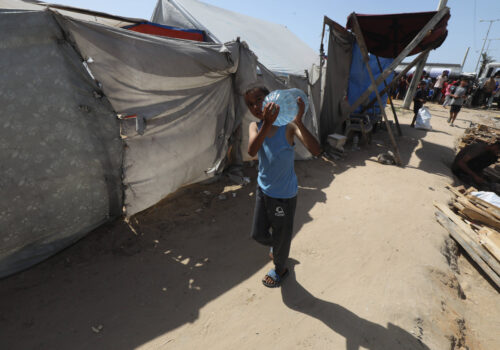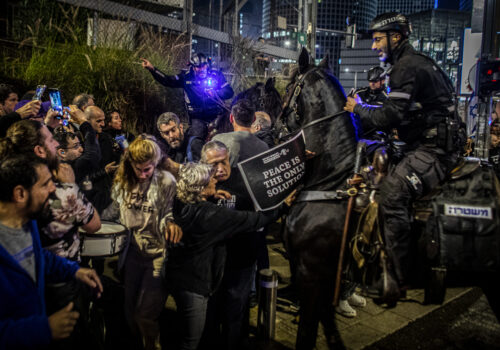Hezbollah escalates in the shadow of US-Israel tensions over Rafah
Hezbollah intensified its attacks against Israel since early May—shifting from pulling its punches on causing Israeli casualties to noticeably seeking to draw blood. Of the twenty-four Israelis slain in attacks from Lebanon since October 8, 2023, Hezbollah deliberately killed four—three soldiers and one civilian—during May’s second week. Nevertheless, Hezbollah is still calibrating its attacks to harm Israel’s Gaza campaign but remain below the threshold that would grant the Israelis international legitimacy to launch a full-scale campaign in Lebanon.
But the group believes this threshold is not fixed. Instead, it rises as Israeli operations in Gaza deepen, which prompts Hezbollah to act while Israel’s attention and resources are concentrated elsewhere. But when these Israeli operations create growing US dissatisfaction—which uniquely restrains Israel, Washington’s “forward military base” and “tool” in Hezbollah’s thinking—Hezbollah feels it has more freedom of action, and thus increases the depth and lethality of its attacks.
Hezbollah has been monitoring growing US-Israeli differences over Rafah operations. After these tensions culminated in Washington halting weapons shipments to Israel in early May, the group believed it could increase the intensity, lethality, and frequency of its attacks with relative impunity. Therefore, when Israel nevertheless initiated Rafah operations on May 6, Hezbollah launched a directed suicide drone attack, killing two Israel Defense Forces (IDF) soldiers.
As the Joe Biden administration doubled down on the weapons freeze, Hezbollah did the same on the lethality of its attacks—deliberately killing one civilian and one soldier, wounding five others, and bombarding the Golan Heights with sixty rockets over the next week. That week also saw Hezbollah launch a suicide drone 35 kilometers (21.7 miles) into northern Israel, its deepest attack yet, and introduce its Jihad Mughniyeh missiles and drone-launched S-5 surface-to-ground missile on May 12 and May 16, respectively.
SIGN UP FOR THIS WEEK IN THE MIDEAST NEWSLETTER
Hezbollah’s independent hostility calculus with Israel can fully explain neither this escalation nor its decision to join the Gaza war. In mid-2019, the group quickly enforced its vow to retaliate against Israel for killing its fighters in Syria. But, after Lebanon’s economy collapsed a month later and Israel crossed that red line twice in subsequent years—even bombing inside Lebanon—Hezbollah noticeably held back, and even revised its retaliation equation to save face. Meanwhile, it tapped Palestinian groups to attack Israel. The group understood it had to delicately navigate Lebanon’s economic collapse to ensure its survival and, therefore, could not risk compounding the financially depleted country’s miseries with a war of unprecedented destruction with Israel.
Those restraining factors remained when the October 7, 2023, attack on Israel by Hamas pit Hezbollah’s duty to assist its partners in Gaza against its need to avoid war in Lebanon. The group’s compromise—an attrition campaign—has followed the trend line of Israeli intervention in Gaza and US-Israel ties.
The war’s onset in October coincided with both minimal Israeli ground involvement in Gaza and peak US support. President Biden conducted an unprecedented wartime visit to Israel, sternly warned Hezbollah against intervention, and deployed US carriers.
Hezbollah’s first attacks were, therefore, relatively tepid. Initially, it only struck the Shebaa Farms, within the old rules of engagement, before slowly expanding to attacking the infrastructure of other Israeli outposts straddling the Lebanon-Israel frontier. Riskier attacks against Arab al-Aramshe, Nahariya, Kiryat Shmona, and Hanita were again outsourced to Palestinian factions.
Hezbollah would soon shift its posture. Five days after Israel’s ground invasion of the coastal enclave on October 27, Hezbollah first deployed loitering munitions, reportedly struck an Israeli border outpost with its 300–500-kilogram Burkan rocket two days later, and then fired its first Katyusha barrage, consisting of twelve rockets, the following day. By late November 2023, Hezbollah was emboldened enough to boast about using Burkan rockets, and then bombard northern Israel with a thirty-five-rocket Katyusha salvo.
In the background, Israel had acquiesced to Washington’s increasingly cumbersome conditions on its operations in Gaza—including delaying its ground invasion, then accepting daily humanitarian pauses, and finally a limited ceasefire—for fear of incurring US disfavor amid attempts to recover its hostages, then numbering more than 250, and a growing two-front war. Meanwhile, Hezbollah was confident it had been spared an imminent Israeli campaign, as the United States was also blaming Israel for escalation in Lebanon.
Hezbollah would raise the ante again in January. By then, many of Israel’s intense urban battles in northern Gaza and Khan Yunis had become sieges over sharper US disapproval and growing pressure to accept unsatisfactory ceasefire terms with Hezbollah. Meanwhile, the group was buoyed by US public sentiment souring on the Gaza war, with its Secretary-General Hassan Nasrallah enthusiastically citing a Harvard CAPS/Harris Poll finding that 51 percent of 18–24-year-old Americans supported “Israel to be ended and given to Hamas and the Palestinians,” as a development that “will have tremendous impact in America.” Within a week, Hezbollah launched a sixty-two-rocket barrage at Meron air traffic control base and hit IDF Northern Command Headquarters in Safed with loitering munitions.
None of this is to suggest that the intensity of Israel and Hezbollah’s direct engagements over the past eight months has had no impact on the group’s immediate responses—only that the tactics Hezbollah has adopted are not entirely reactionary, but are instead strategically attuned to this broader context. For example, while Hezbollah’s strikes on Meron and Safed followed Israel’s assassinations of senior Hamas official Saleh Arouri and Radwan deputy commander Wissam Tawil, Israel was preoccupied with besieging two Gazan cities and absorbing a high degree of US pressure. By contrast, when Israel killed five Radwan operatives and Qassam Brigades deputy commander in Lebanon Khalil Kharraz in November, with strong US backing, Hezbollah’s response was comparably restrained.
Hezbollah understands the risks it is inviting upon itself and Lebanon. Nasrallah, while exaggerating the group’s contributions to the war, has acknowledged that “even one of the[se] operations…in the past” would have prompted Israel to declare war. While Israel’s preoccupation with Gaza is therefore crucial to Hezbollah’s freedom of action, “the American position,” in Nasrallah’s words, and developments in the United States are “decisive.” After all, in 2006, the US greenlight enabled Israel to suspend an ongoing ground operation in Gaza to fight a monthlong war against Hezbollah in response to the latter’s July 12, 2006, attack. This, Nasrallah said, is because “America controls Israel…when the Americans put their foot down, threatening to halt funds, Israel quakes in fear. When the Americans halt weapons shipments, the Israeli Chief of Staff is forced to take stock of his remaining ammunition.”
This is an exaggeration, but not by much. Israel will prioritize and pursue its interests, but diminished US support impacts its ability to do so. Therefore, Israel will continue its necessary pursuit of the destruction of Palestinian factions in Rafah. Hezbollah, conversely, will act to ensure their survival. But as the group does so, it will cast a constant eye on Washington—searching for signs of displeasure to continue transitioning the ongoing clashes with Israel into deadlier, more escalatory phases.
David Daoud is a senior fellow at the Foundation for Defense of Democracies (FDD), focusing on Hezbollah, Israel, and Lebanon issues. Follow him on X: @DavidADaoud.
Ahmad Sharawi is a research analyst at The Foundation for Defense of Democracies, focusing on Middle East affairs. Follow him on X: @AhmadA_Sharawi.
Further reading
Tue, May 21, 2024
A Rafah invasion might kill peace between Israel and Egypt
MENASource By Shahira Amin
Egypt’s intention to pull out of hostage deal mediation efforts and the continued closure of the Rafah border crossing are alarm bells for Israel.
Tue, Feb 13, 2024
Lebanon is using Hezbollah to blackmail Israel on border talks
MENASource By David Daoud
The Lebanese government seems to believe that it will get better terms as international desperation to stop Hezbollah’s attacks grows.
Wed, Mar 6, 2024
Netanyahu might be losing ground, but his politics still resonate with most Israelis
MENASource By Ksenia Svetlova
Polls show that the Israeli public is torn on many issues, but trust in Netanyahu’s government is not one of them.
Image: Israeli soldiers take shelter in an underpass, amid cross-border hostilities between Hezbollah and Israeli forces, in Hurfeish, a Druze Arab village in northern Israel, June 5, 2024. REUTERS/Avi Ohayon




